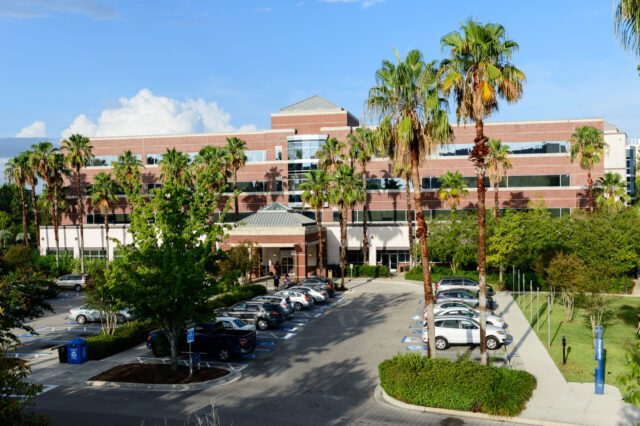UF Health Pediatrics Neonatal Brain Team Clinic
Address
Gainesville, Florida 32608
Phone Numbers
Hours of Operation
See full hours
The most frequent brain injury for term newborns is hypoxic-ischemic injury (HIE) and for premature infants is intraventricular hemorrhage (IVH) and white matter injury (WMI). At the UF Health Pediatrics Neonatal Brain Team Clinic, our specialists make sure your child gets the treatment they need, whether it’s one of those aforementioned brain injuries or less common ones, such as stroke and cystic periventricular leukomalacia (PVL).
About Us
Our clinic:
- Evaluates your baby
- Ensures your baby has the necessary referrals. Most common referrals include Early Steps, physical therapy (PT), occupational therapy (OT), speech therapy, neurology, ophthalmology and hearing screening
- Provides feedback to the clinical team (your pediatrician, OT/PT/speech therapist and other consultants)
If your child had an MRI compatible with a neonatal brain injury, it’s important to act now.
It is difficult to detect developmental problems in a baby. We cannot test a baby in the same way that we ask questions to a school-aged child or adult. Early stimulation is important for your baby, as well as early detection of subtle deviations of normal development. The earlier we detect problems or disorders, the sooner we can help the infant overcome them. Infant brains have a great capacity of neuroplasticity, which is the brain’s capacity to remodel, adapt and recover. Although neuroplasticity is present throughout one’s lifetime, this capacity is greater during the first months of life. In addition, the brain can compensate for lost function and maximize remaining functions. Environment and specific stimulation play a key role in neuroplasticity.
Over the first few years of life, the brain grows rapidly. As each neuron matures, it sends out multiple branches (axons, which send information out, and dendrites, which take in information), increasing the number of synaptic contacts and laying the specific connections from neuron to neuron.
At birth, each neuron in the cerebral cortex has approximately 2,500 synapses (contact with other neurons). By the time infants are two or three years old, the number of synapses is approximately 15,000 synapses per neuron. This amount is about twice that of the average adult brain. As we age, old connections are deleted through a process called synaptic pruning. If a connection is NOT used (for example after brain injury), it will get weaker and weaker and finally deleted.
Early stimulation and therapies equals more opportunity to increase synapses, and therefore, more opportunity to maximize the potential of your child's brain.
Telehealth
Please contact your physician to schedule an appointment and they will determine if a telehealth visit is right for you. View our telehealth section for assistance in how to prepare for and connect to a scheduled appointment. If you still need assistance, please contact our office at 352.265.6200 if you have any questions or need help scheduling an appointment.
We appreciate your trust in our clinical care and look forward to serving your health care needs.
Our experts
Related conditions & treatments
- Hypoxic-Ischemic Encephalopathy (HIE)
- Intraventricular hemorrhage of the newborn
- Neonatal brain injury
- Neonatal stroke
- Periventricular leukomalacia
- White matter injury
Meeting your health care needs
-
Cancer Rehabilitation
Physical therapy, occupational therapy and massage therapy services for patients experiencing problems associated with surgery or due to side effects of chemotherapy or radiation treatment.
-
Medical Imaging Services
UF Health offers day-of, on-site imaging services in a qualified medical center.
-
Medical Plaza Specialty Pharmacy
UF Health Specialty Pharmacy focuses on medication therapy for patients with complex disease states. Medications in our specialty pharmacy range from oral to cutting-edge injectable and biologic products.
-
Outpatient Lab Services
Full-service, on-site lab services and testing for your convenience.
-
Pharmacies
Accepts most prescription plans; competitive prices; on-site.
-
Wheelchair and Adaptive Equipment Fitting
UF Health has an adaptive seating clinic where our therapists evaluate patients for both adaptive equipment and mobility device needs.
For your convenience and peace of mind
-
Accessibility
Aids and services are available to help people with disabilities communicate effectively.
-
ATM and Banking
Many of UF Health's properties have various branch ATMs and/or branch offices.
-
Baby-Changing Station
Baby-changing stations are available in many of UF Health's restrooms.
-
Coffee
Options include Opus Coffee and Starbucks in the hospital atriums.
-
-
Free Wifi
Patients and guests get free wireless internet access at UF Health hospitals.
-
Gardens and Outdoor Spaces
The Garden of Hope, Sun Terrace, and other spaces help patients and families relax.
-
Gender-Neutral Restroom
Gender-neutral, public restrooms are located throughout UF Health's properties.
-
Gift Shops
The Gift Stops offer a wide variety of gifts and products for patients and families.
-
Interpreters / Hearing Impaired
UF Health provides free language services to people whose primary language is not English.
-
Medical Records
You can download a form or call (352) 594-0909 to have medical records mailed or faxed.
-
Notary Public
Notary services are available to patients and visitors Monday through Friday 8 a.m. to 5 p.m.
-
Smoke-Free
Smoking, chewing tobacco, or using electronic cigarettes is prohibited on UF Health properties.
-
Social Services
Social workers are part of the patient's care team and work with medical staff and nurses.
